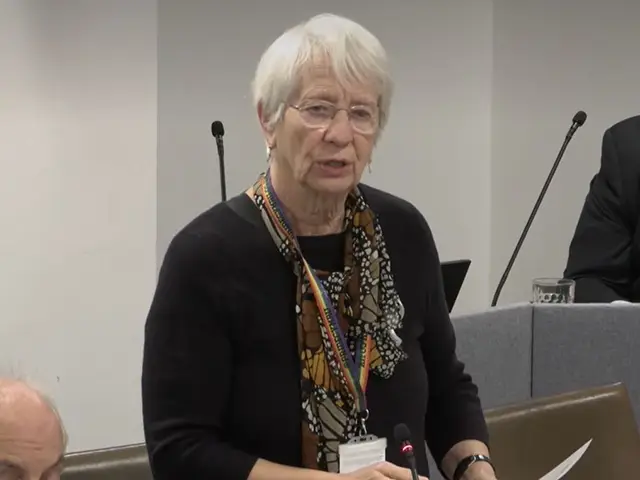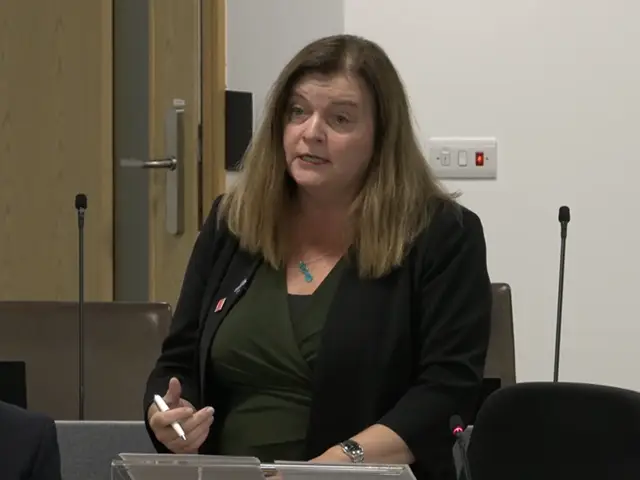Politics
‘Fundamental flaws’ cost Welsh taxpayers

 FUNDAMENTAL flaws in the way the Regeneration Investment Fund for Wales (RIFW) was managed, overseen, and advised, cost Welsh taxpayers tens of millions of pounds, according to a National Assembly for Wales committee.
FUNDAMENTAL flaws in the way the Regeneration Investment Fund for Wales (RIFW) was managed, overseen, and advised, cost Welsh taxpayers tens of millions of pounds, according to a National Assembly for Wales committee.
RIFW was set up as an arms-length body by the Welsh Government to sell off land around Wales including in north Wales, Monmouthshire and Cardiff and use the money, in conjunction with European funding, to reinvest in areas in need of regeneration.
But the Public Accounts Committee found that the body was poorly managed, poorly overseen by government, and that, because of a change in the direction of RIFW, from one of regeneration to property asset disposals, some of the Board members felt they lacked the necessary knowledge and expertise to fulfill their roles.
It also learned that the Board was not presented with key information regarding the value of the land in its portfolio, or of expressions of interest from potential buyers. Fifteen plots of land, originally supposed to be sold separately, were instead sold as a single portfolio at a price which did not take into account potential use of the land in the future. This decision resulted in Welsh taxpayers missing out on tens of millions of pounds of funding. The Committee learned that one of the organisations charged with offering expert advice to the Board, Lambert Smith Hampton Ltd, had previously acted on behalf of a director of the buyer of the land, South Wales Land Developments Ltd (SWLD), and signed an agreement to do so again one day after the sales went through.
The Committee concluded that the RIFW Board had been poorly served by its own expert advisors.
Members also agreed that, in light of South Wales Land Developments Ltd onward sales, the Welsh Government’s contention that it is not possible to demonstrate that the sale was under value, is unconvincing, pointing to the following as evidence (overage is an agreed sum of money to claw-back in addition to the sale price if the buyer meets certain conditions):
- The Rhoose site was purchased from RIFW for less than £3 m, without overage, and sold on by SWLD for nearly £10.5 m;
- The Abergele site was purchased from RIFW for £0.1 m, without overage, and sold for £1.9m.
- Lisvane, near Cardiff, was / is the ‘jewel in the crown’ and should have been disposed of via a properly marketed open and competitive sale process. The Committee believed it incomprehensible that this was sold to SWLD at an agricultural land value of £1.835 million (even with overage) when its potential open market value for residential housing is at least £39 million.
“The Public Accounts Committee’s inquiry into the Regeneration Investment Fund for Wales (RIFW) has been one of the most significant and deeply troubling inquiries undertaken by the Committee,” said Darren Millar AM, Chair of the Public Accounts Committee.
“The fact that one of the largest sales of publicly owned land in Wales should have generated tens of millions of pounds more for the taxpayer than it did, is inexcusable.
“While the Committee found the concept of RIFW to be innovative, we concluded that it was poorly executed due to fundamental flaws in Welsh Government oversight and governance arrangements, and that the Fund was poorly served from those appointed and trusted to provide the Board with professional advice and expertise.
“It is regrettable that many of the flaws we identified are consistent with issues this Committee has considered during previous inquiries.”
The Committee makes 18 recommendations in its report including:
- The Welsh Government must strengthen monitoring and oversight arrangements of its arms-length bodies and, in particular, ensure that any concerns are swiftly identified and escalated internally;
- That measures are put in place to ensure that Board Members have the appropriate expertise and capacity to fulfil their duties and receive adequate and appropriate induction training, and;
- The Welsh Government should ensure that robust overage arrangements are considered whenever it disposes of public assets that possess future development potential.
The Regeneration Investment Fund for Wales (RIFW) was established in December 2009 in response to the constrained financial climate which restricted access to capital for investment in regeneration in Wales. RIFW was created as a Limited Liability Partnership (LLP) wholly-owned by the Welsh Government. RIFW’s purpose was to invest £55 m initially in urban regeneration schemes across Wales, comprising £25 million of European Regional Development Fund (ERDF) and £30 m of Welsh Government funding. The Welsh Government provided RIFW with £9.4 m cash, and a portfolio of 18 land and property assets valued in existing use at £20.5 m , based on a valuation commissioned by the Welsh Government.
Politics
Ajax armoured vehicle trial paused again as MP warns jobs must be protected

A FRESH pause to trials of the Ajax armoured vehicle programme has prompted renewed calls for workers’ jobs in Wales to be safeguarded.
The trial has been halted after another soldier reportedly fell ill during testing, adding to a series of delays and technical problems that have dogged the long-running Ministry of Defence project.
Welsh Liberal Democrat Westminster spokesperson David Chadwick MP said the repeated failures raised serious questions about accountability and cost.
He warned ministers must ensure taxpayers are not left footing the bill if the programme ultimately collapses, arguing that responsibility should rest with defence contractor General Dynamics.
“With the Ajax programme beset by repeated failures and significant delays, ministers need to confirm that taxpayers will not be left to bear the cost of these failures,” he said.
“If the project does end up being scrapped, the Government must ensure that the 400 workers currently employed on the programme in Merthyr Tydfil will receive full support.”
Mr Chadwick added that the Merthyr site should be prioritised for future defence and military development work if Ajax does not proceed, to protect skilled jobs and investment in the area.
The Ajax programme has faced years of scrutiny over safety concerns, excessive noise and vibration, and mounting delays, with the latest pause reigniting pressure on the Government to clarify the project’s future.
Health
‘Children spending more time in digital worlds than the real one’

CHILDREN are spending more time in digital worlds than the real one, the Senedd has heard, with excessive screen use shaping behaviour and health in ways society cannot ignore.
Labour’s John Griffiths expressed concerns about the impact of smartphones and online gaming on young people amid an “epidemic of screen use” in Wales.
Mr Griffiths titled the debate “Locked in, Bruh!” – “the state of playing a video game while oblivious to anything else” – on the suggestion of Tom, a teenager from Newport.
He raised research from the Centre for Social Justice, a thinktank, which estimates that up to 814,000 UK children aged three to five are already engaging with social media.
The Newport East Senedd Member told the chamber two-thirds of primary school pupils in Wales have their own smartphone by the age of 11.
Mr Griffiths said boys spend two hours more a day on online gaming while girls spend more time on social media and “reel scrolling” which has been linked to damaging self-esteem.
He told Senedd Members: “Boys are becoming more short-tempered and violent when exposed to violent video games and there is, rightly, much concern that children in more deprived families are particularly vulnerable.”
Mr Griffiths, who was first elected in 1999 and will stand down in 2026, said children aged five to 16 spend at least six hours a day looking at a screen. He added that for children, aged 11 to 14, that figure rises to nine hours a day.
He pointed to research showing more than 70% of young people in the UK do not undertake an hour of physical activity a day yet have at least six hours to spend looking at a screen.
He said: “Children are sat inside with a screen at the end of their nose and are not spending time outside enjoying their local communities or playing and interacting with friends.”
Mr Griffiths warned of increasing levels of obesity and rising numbers of young people reporting vision problems, with one in three children globally now short-sighted.
He told the Senedd: “As for the mental health and wider social impacts, anxiety and depression are increasingly linked to excessive screen use as is sleep disruption – with social media interfering with rest and emotional development.”
He raised a New Zealand study of more than 6,000 children that found a correlation between excessive screen time and below-average performance in literacy and numeracy. He warned children have increasingly shortened attention spans and an inability to concentrate.
Mr Griffiths shared the case of his constituent, Danielle, who said her son becomes more aggressive and snappier after a significant time gaming. Lucy, another constituent, explained how her children find the endless reels on social media addictive.
“Once they start scrolling, it’s hard to break that cycle,” the Senedd Member said. “And when she and her husband take the devices away, it often results in tantrums and tears.”
Mr Griffiths raised the example of countries such as Australia, France and Italy which have introduced strict age checks and bans on social media for under 16s.
He acknowledged such a policy would need to come from the UK Government because powers over internet services are not devolved. But he said Wales has the authority to introduce measures through education policy on, for example, smartphones in schools.
The Tories’ Sam Rowlands warned algorithms are having a “sickening” effect on teenagers who are eight times more likely to act on self-harm urges when exposed to such content. “TikTok users with eating disorders receive over 4,000% more toxic content,” he warned.
Responding to Wednesday’s (December 17) debate, Jane Hutt recognised how so-called doom scrolling can have a detrimental impact on young people.
Wales’ social justice secretary said: “We are living through profound change. Childhood today is shaped by technology in ways that were unimaginable a generation ago… For many young people, screens, smartphones and online gaming are part of everyday life.”

Community
Senedd unanimously backs sign language bill

PLANS to make Wales the best place in the UK for British Sign Language (BSL) users moved a significant step closer to becoming law with the Senedd’s unanimous support.
If ultimately passed, the BSL bill – introduced by the Conservatives’ Mark Isherwood – would end Wales’ status as the only UK nation without specific sign language protections.
Leading a debate on Wednesday December 17, Mr Isherwood said the Senedd supporting the bill’s general principles was a “huge step ahead” for the “vital” legislation.
Mr Isherwood, a disability rights campaigner for decades, explained his backbench bill would introduce legal requirements to promote and facilitate the use of BSL in Wales.
He said the bill, if passed, would be the most progressive piece of BSL legislation anywhere in the UK, recognising BSL is a language in its own right, not a communication support need.

He highlighted that the bill would establish a BSL adviser role, the first statutory post of its kind in the UK, describing its importance as something that “cannot be overstated”.
Mr Isherwood, who chairs cross-party groups on disability and deaf issues, told the Senedd: “This isn’t just my bill. This is the bill of the BSL community. Let’s make this happen together and be proud of it together on behalf of deaf people across Wales.”
Jenny Rathbone, the Labour chair of the Senedd’s equality committee, was convinced of the “overdue” need for legislation to give more standing to British Sign Language.

Ms Rathbone said the committee heard the biggest barrier “by some margin” was the availability of interpreters and the sustainability of the workforce.
She quoted a signer who told the committee: “The bill would make us feel respected and valued. But without proper funding, planning and deaf-led leadership, it won’t go far enough.”
Sioned Williams, Plaid Cymru’s shadow social justice secretary, told Senedd members: “Language is a part of our identity, our culture and our personal dignity.
“When someone cannot use their language, they are excluded from education, health care, employment and public life – and that is not acceptable in today’s Wales.”

Ms Williams warned that if the legislation fails to deliver real change, the deaf community would be left “angry, disappointed and very, very disheartened”.
She expressed concern that the bill does not legally require the BSL adviser to be a deaf person, arguing it is “not appropriate, possible or efficient” for non-signers to lead the way.
Mr Isherwood defended the decision not to require that the adviser must be deaf, warning a successful legal challenge to a single such provision could cause the entire bill to fail.
Welsh Liberal Democrat leader Jane Dodds warned of an immediate workforce crisis, with only 54 registered sign language interpreters in Wales as of July.
With many now approaching the end of their working lives, she said: “We cannot – we must not – allow this bill to fail because we didn’t have the foresight to address this crisis now.”
Support for the bill stretched across the political spectrum, with Reform UK’s Laura Anne Jones similarly welcoming the “long-overdue” and “vital” legislation.
Jane Hutt, Wales’ social justice secretary, confirmed the Welsh Government’s financial backing, committing £214,300 for the bill’s first year of implementation in 2026/27.
If it clears the final hurdles, Mr Isherwood’s proposal will be the first backbench bill to enter the statute book in about a decade following the Nurse Staffing Levels (Wales) Act 2016.
-

 Crime24 hours ago
Crime24 hours agoMilford Haven man jailed after drunken attack on partner and police officers
-

 News4 days ago
News4 days agoDyfed-Powys Police launch major investigation after triple fatal crash
-

 Crime22 hours ago
Crime22 hours agoTeenager charged following rape allegation at Saundersfoot nightclub
-

 Crime3 days ago
Crime3 days agoMan sent to Crown Court over historic indecent assault allegations
-

 Crime2 days ago
Crime2 days agoMan charged with months of coercive control and assaults
-

 Crime5 days ago
Crime5 days agoMan spared jail after baseball bat incident in Milford Haven
-

 Crime3 days ago
Crime3 days agoMilford Haven man admits multiple offences after A477 incident
-

 Crime2 days ago
Crime2 days agoWoman ‘terrified in own home’ after ex breaches court order























